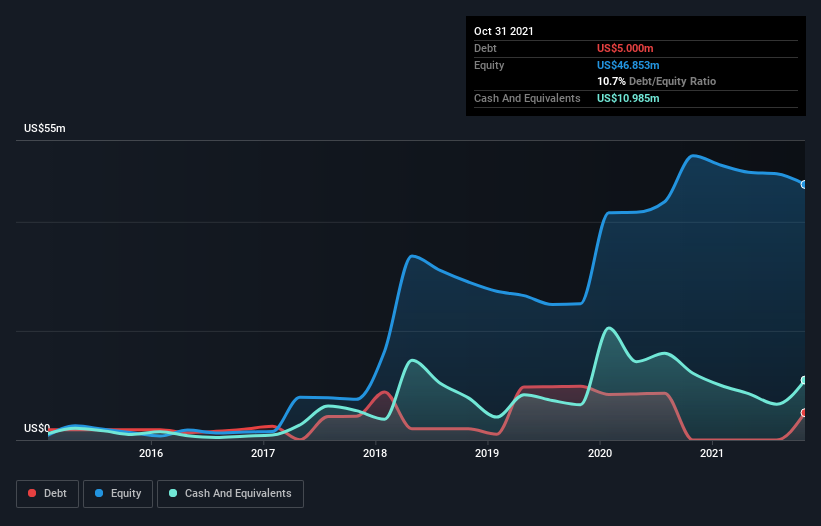Legendary fund manager Li Lu (who Charlie Munger backed) once said, 'The biggest investment risk is not the volatility of prices, but whether you will suffer a permanent loss of capital.' When we think about how risky a company is, we always like to look at its use of debt, since debt overload can lead to ruin. As with many other companies Aspen Group, Inc. (NASDAQ:ASPU) makes use of debt. But is this debt a concern to shareholders?
Why Does Debt Bring Risk?
Debt and other liabilities become risky for a business when it cannot easily fulfill those obligations, either with free cash flow or by raising capital at an attractive price. Ultimately, if the company can't fulfill its legal obligations to repay debt, shareholders could walk away with nothing. However, a more usual (but still expensive) situation is where a company must dilute shareholders at a cheap share price simply to get debt under control. Of course, debt can be an important tool in businesses, particularly capital heavy businesses. When we examine debt levels, we first consider both cash and debt levels, together.
See our latest analysis for Aspen Group
What Is Aspen Group's Debt?
You can click the graphic below for the historical numbers, but it shows that as of October 2021 Aspen Group had US$5.00m of debt, an increase on none, over one year. But on the other hand it also has US$11.0m in cash, leading to a US$5.99m net cash position.

A Look At Aspen Group's Liabilities
Zooming in on the latest balance sheet data, we can see that Aspen Group had liabilities of US$19.5m due within 12 months and liabilities of US$22.7m due beyond that. On the other hand, it had cash of US$11.0m and US$21.3m worth of receivables due within a year. So it has liabilities totalling US$9.97m more than its cash and near-term receivables, combined.
Since publicly traded Aspen Group shares are worth a total of US$65.6m, it seems unlikely that this level of liabilities would be a major threat. Having said that, it's clear that we should continue to monitor its balance sheet, lest it change for the worse. While it does have liabilities worth noting, Aspen Group also has more cash than debt, so we're pretty confident it can manage its debt safely. There's no doubt that we learn most about debt from the balance sheet. But it is future earnings, more than anything, that will determine Aspen Group's ability to maintain a healthy balance sheet going forward. So if you want to see what the professionals think, you might find this free report on analyst profit forecasts to be interesting.
Over 12 months, Aspen Group reported revenue of US$74m, which is a gain of 26%, although it did not report any earnings before interest and tax. Shareholders probably have their fingers crossed that it can grow its way to profits.
So How Risky Is Aspen Group?
Statistically speaking companies that lose money are riskier than those that make money. And in the last year Aspen Group had an earnings before interest and tax (EBIT) loss, truth be told. Indeed, in that time it burnt through US$10.0m of cash and made a loss of US$8.9m. However, it has net cash of US$5.99m, so it has a bit of time before it will need more capital. Aspen Group's revenue growth shone bright over the last year, so it may well be in a position to turn a profit in due course. Pre-profit companies are often risky, but they can also offer great rewards. When analysing debt levels, the balance sheet is the obvious place to start. However, not all investment risk resides within the balance sheet - far from it. For example - Aspen Group has 3 warning signs we think you should be aware of.
When all is said and done, sometimes its easier to focus on companies that don't even need debt. Readers can access a list of growth stocks with zero net debt 100% free, right now.
New: Manage All Your Stock Portfolios in One Place
We've created the ultimate portfolio companion for stock investors, and it's free.
• Connect an unlimited number of Portfolios and see your total in one currency
• Be alerted to new Warning Signs or Risks via email or mobile
• Track the Fair Value of your stocks
Have feedback on this article? Concerned about the content? Get in touch with us directly. Alternatively, email editorial-team (at) simplywallst.com.
This article by Simply Wall St is general in nature. We provide commentary based on historical data and analyst forecasts only using an unbiased methodology and our articles are not intended to be financial advice. It does not constitute a recommendation to buy or sell any stock, and does not take account of your objectives, or your financial situation. We aim to bring you long-term focused analysis driven by fundamental data. Note that our analysis may not factor in the latest price-sensitive company announcements or qualitative material. Simply Wall St has no position in any stocks mentioned.
About OTCPK:ASPU
Aspen Group
An education technology company, provides online higher education services in the United States.
Good value with adequate balance sheet.
Similar Companies
Market Insights
Community Narratives



